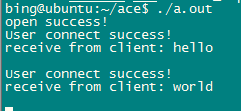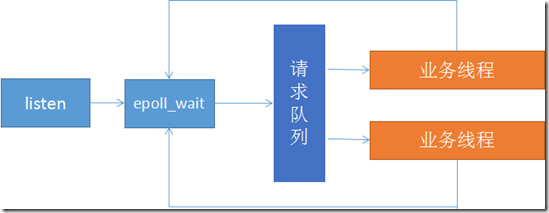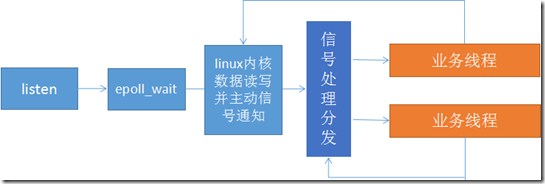原文出自http://www.cnblogs.com/binchen-china,禁止转载。
在之前的文章中提到过Reactor模式和Preactor模式,现在利用ACE的Reactor来实现一个基于Reactor框架的服务器。
首先回顾下Reactor模式和Preactor模式。
Reactor模式:
Reactor模式实现非常简单,使用同步IO模型,即业务线程处理数据需要主动等待或询问,主要特点是利用epoll监听listen描述符是否有响应,及时将客户连接信息放于一个队列,epoll和队列都是在主进程/线程中,由子进程/线程来接管描述符传输的数据,对描述符进行下一步操作,包括connect和数据读写。主程读写就绪事件。整个过程都需要先获取描述符状态,在状态允许下再执行任务。
大致流程图如下:
Preactor模式:
Preactor模式完全将IO处理和业务分离,使用异步IO模型,即内核完成数据处理后主动通知给应用处理,主进程/线程不仅要完成listen任务,还需要完成内核数据缓冲区的映射,直接将数据buff传递给业务线程,业务线程只需要处理业务逻辑即可。整个过程直接推送任务,描述符状态是否允许执行任务由内核去调度处理。
大致流程如下:
ACE的Reactor模式
所有服务器都可以归纳为以下三层:
- I/O:处理底层IO事件
- Dispatch:事件消息派发
- Service:业务处理
ACE的Reactor处于I/O和Dispatch层。提供了I/O监控和消息Dispatch。其中I/O需要用户以handle的形式提供到ACE_Reactor内。
Dispatch需要以ACE_Event_Handler为载体,也就是说要实现一个完整的Reactor只依赖ACE_Reactor类是无法完成的。
上篇博文利用ACE的Socket可以看出一个ACE_SOCK_Acceptor和ACE_SOCK_Stream就可以完成服务器代码。现在要做的是,
1.引入Reactor,把Acceptor和Stream两个I/O分别放在两个继承于ACE_Event_Handler的类中注册给ACE_Reactor。
2.主函数注册包含ACE_SOCK_Acceptor的类到ACE_Reactor中,当ACE_SOCK_Acceptor收到数据即有客户端连接后再给对应的客户端创建一个ACE_SOCK_Stream通道并注册到ACE_Reactor中。
使用ACE_Reactor实现的Server代码:
1 #include <ace/INET_Addr.h> 2 #include <ace/SOCK_Acceptor.h> 3 #include <ace/SOCK_Stream.h> 4 #include <ace/Reactor.h> 5 #include <ace/Log_Msg.h> 6 #include <list> 7 8 #define MAX_BUFF_SIZE 1024 9 #define LISTEN_PORT 5010 10 #define SERVER_IP ACE_LOCALHOST 11 12 class ServerStream : public ACE_Event_Handler 13 { 14 public: 15 ServerStream(); 16 ~ServerStream(); 17 ACE_SOCK_Stream& GetStream(){return Svr_stream;} //给accept提供接口绑定数据通道 18 virtual int handle_input(ACE_HANDLE fd); //I/O触发事件后调用 19 void close(); 20 virtual ACE_HANDLE get_handle(void) const {return Svr_stream.get_handle();} //不重载需要手动将handle传入ACE_Reactor 21 private: 22 ACE_INET_Addr Cli_addr; 23 ACE_SOCK_Stream Svr_stream; 24 }; 25 26 ServerStream::ServerStream() 27 { 28 29 } 30 31 ServerStream::~ServerStream() 32 { 33 close(); 34 } 35 36 int ServerStream::handle_input(ACE_HANDLE fd) 37 { 38 char strBuffer[MAX_BUFF_SIZE]; 39 int byte = Svr_stream.recv(strBuffer,MAX_BUFF_SIZE); //可读数据 40 if (-1 == byte) 41 { 42 ACE_DEBUG((LM_INFO, ACE_TEXT("receive data failed\n"))); 43 } 44 else if(0 == byte) 45 { 46 close(); 47 ACE_DEBUG((LM_INFO, ACE_TEXT("client closed!\n"))); 48 } 49 else 50 { 51 ACE_DEBUG((LM_INFO, ACE_TEXT("receive from client: %s\n"),strBuffer)); 52 } 53 } 54 55 void ServerStream::close() 56 { 57 Svr_stream.close(); 58 ACE_Reactor::instance()->remove_handler(this,ACE_Event_Handler::READ_MASK | ACE_Event_Handler::DONT_CALL); 59 //delete this; 60 } 61 62 class ServerAcceptor : public ACE_Event_Handler 63 { 64 public: 65 ServerAcceptor(int port,char* ip); 66 ~ServerAcceptor(); 67 bool open(); 68 virtual int handle_input(ACE_HANDLE fd); //有client连接 69 void close(); 70 virtual ACE_HANDLE get_handle(void) const {return Svr_aceept.get_handle();} 71 private: 72 ACE_INET_Addr Svr_addr; 73 ACE_SOCK_Acceptor Svr_aceept; 74 std::list<ServerStream*> m_streamPool; //stream pool 75 }; 76 77 ServerAcceptor::ServerAcceptor(int port,char* ip):Svr_addr(port,ip) 78 { 79 if (!open()) //open listen port 80 { 81 ACE_DEBUG((LM_INFO, ACE_TEXT("open failed!\n"))); 82 } 83 else 84 { 85 ACE_DEBUG((LM_INFO, ACE_TEXT("open success!\n"))); 86 } 87 } 88 89 ServerAcceptor::~ServerAcceptor() 90 { 91 close(); 92 std::list<ServerStream*>::iterator it; 93 for (it = m_streamPool.begin();it != m_streamPool.end();++it) 94 { 95 if (NULL != (*it)) 96 { 97 (*it)->close(); 98 delete (*it); 99 } 100 } 101 } 102 103 bool ServerAcceptor::open() 104 { 105 if (-1 == Svr_aceept.open(Svr_addr,1)) 106 { 107 ACE_DEBUG((LM_ERROR,ACE_TEXT("failed to accept\n"))); 108 Svr_aceept.close(); 109 return false; 110 } 111 return true; 112 } 113 114 int ServerAcceptor::handle_input(ACE_HANDLE fd ) 115 { 116 ServerStream *stream = new ServerStream(); //产生新通道 117 if (NULL != stream) 118 { 119 m_streamPool.push_back(stream); 120 } 121 if (Svr_aceept.accept(stream->GetStream()) == -1) //绑定通道 122 { 123 printf("accept client fail\n"); 124 return -1; 125 } 126 ACE_Reactor::instance()->register_handler(stream,ACE_Event_Handler::READ_MASK); //通道注册到ACE_Reactor 127 ACE_DEBUG((LM_ERROR,ACE_TEXT("User connect success!\n"))); 128 } 129 130 void ServerAcceptor::close() 131 { 132 ACE_Reactor::instance()->remove_handler(this,ACE_Event_Handler::ACCEPT_MASK); 133 Svr_aceept.close(); 134 } 135 136 int ACE_TMAIN() 137 { 138 ServerAcceptor server(LISTEN_PORT,(char *)SERVER_IP); 139 ACE_Reactor::instance()->register_handler(&server,ACE_Event_Handler::ACCEPT_MASK); //listen port注册到ACE_Reactor 140 ACE_Reactor::instance()->run_reactor_event_loop(); //进入消息循环,有I/O事件回调handle_input 141 return 0; 142 }
测试结果:
终端1:

终端2:

终端3:

ACE_Reactor内部已经帮我们实现了IO复用。
有了Reactor的demo后,下面一步步查看ACE_Reactor内部是如何运作的:
ACE_Reactor注册EVENT,重载了一个register_handler:
1 int 2 ACE_Reactor::register_handler (ACE_Event_Handler *event_handler, 3 ACE_Reactor_Mask mask) 4 { 5 // Remember the old reactor. 6 ACE_Reactor *old_reactor = event_handler->reactor (); 7 8 // Assign *this* <Reactor> to the <Event_Handler>. 9 event_handler->reactor (this); 10 11 int result = this->implementation ()->register_handler (event_handler, mask); 12 if (result == -1) 13 // Reset the old reactor in case of failures. 14 event_handler->reactor (old_reactor); 15 16 return result; 17 }
第11行实际是ACE_Reactor_Impl *implementation (void) const;在做实际功能。进一步查看implementation 是如何注册的。
1 template <class ACE_SELECT_REACTOR_TOKEN> int 2 ACE_Select_Reactor_T<ACE_SELECT_REACTOR_TOKEN>::register_handler 3 (ACE_Event_Handler *handler, 4 ACE_Reactor_Mask mask) 5 { 6 ACE_TRACE ("ACE_Select_Reactor_T::register_handler"); 7 ACE_MT (ACE_GUARD_RETURN (ACE_SELECT_REACTOR_TOKEN, ace_mon, this->token_, -1)); 8 return this->register_handler_i (handler->get_handle (), handler, mask); 9 }
这里开始大量使用模板,这里重载了两个在最后调用register_handler_i,在第8行,可以看到调用了get_handle,也就是我们重载的那个函数,所以我们不需要传入ACE_Reactor,它在这一步调用了我们重新的虚函数,获得了handle,当然也可以不做重写,手动传入handle。这个handle就是我们要处理的I/O,而handler则是我们继承ACE_Event_Handler的类。
1 template <class ACE_SELECT_REACTOR_TOKEN> int 2 ACE_Select_Reactor_T<ACE_SELECT_REACTOR_TOKEN>::register_handler_i 3 (ACE_HANDLE handle, 4 ACE_Event_Handler *event_handler, 5 ACE_Reactor_Mask mask) 6 { 7 ACE_TRACE ("ACE_Select_Reactor_T::register_handler_i"); 8 9 // Insert the <handle, event_handle> tuple into the Handler 10 // Repository. 11 return this->handler_rep_.bind (handle, event_handler, mask); 12 }
到这里,我们看到代码handler_rep_将hande和event_handler绑定了起来,handler_rep_在Select_Reactor_Base.h内为ACE_Select_Reactor_Impl的成员变量。下面我们继续看bind实际是在做什么操作。
1 // Bind the <ACE_Event_Handler *> to the <ACE_HANDLE>. 2 int 3 ACE_Select_Reactor_Handler_Repository::bind (ACE_HANDLE handle, 4 ACE_Event_Handler *event_handler, 5 ACE_Reactor_Mask mask) 6 { 7 ACE_TRACE ("ACE_Select_Reactor_Handler_Repository::bind"); 8 9 if (event_handler == 0) 10 return -1; 11 12 if (handle == ACE_INVALID_HANDLE) 13 handle = event_handler->get_handle (); 14 15 if (this->invalid_handle (handle)) 16 return -1; 17 18 // Is this handle already in the Reactor? 19 bool existing_handle = false; 20 21 #if defined (ACE_WIN32) 22 23 map_type::ENTRY * entry = 0; 24 25 int const result = 26 this->event_handlers_.bind (handle, event_handler, entry); 27 28 if (result == -1) 29 { 30 return -1; 31 } 32 else if (result == 1) // Entry already exists. 33 { 34 // Cannot use a different handler for an existing handle. 35 if (event_handler != entry->item ()) 36 { 37 return -1; 38 } 39 else 40 { 41 // Remember that this handle is already registered in the 42 // Reactor. 43 existing_handle = true; 44 } 45 } 46 47 #else 48 49 // Check if this handle is already registered. 50 ACE_Event_Handler * const current_handler = 51 this->event_handlers_[handle]; 52 53 if (current_handler) 54 { 55 // Cannot use a different handler for an existing handle. 56 if (current_handler != event_handler) 57 return -1; 58 59 // Remember that this handle is already registered in the 60 // Reactor. 61 existing_handle = true; 62 } 63 64 this->event_handlers_[handle] = event_handler; 65 66 if (this->max_handlep1_ < handle + 1) 67 this->max_handlep1_ = handle + 1; 68 69 #endif /* ACE_WIN32 */ 70 71 if (this->select_reactor_.is_suspended_i (handle)) 72 { 73 this->select_reactor_.bit_ops (handle, 74 mask, 75 this->select_reactor_.suspend_set_, 76 ACE_Reactor::ADD_MASK); 77 } 78 else 79 { 80 this->select_reactor_.bit_ops (handle, 81 mask, 82 this->select_reactor_.wait_set_, 83 ACE_Reactor::ADD_MASK); 84 85 // Note the fact that we've changed the state of the <wait_set_>, 86 // which is used by the dispatching loop to determine whether it can 87 // keep going or if it needs to reconsult select(). 88 // this->select_reactor_.state_changed_ = 1; 89 } 90 91 // If new entry, call add_reference() if needed. 92 if (!existing_handle) 93 event_handler->add_reference (); 94 95 return 0; 96 }
这里非常关键,第50行,event_handlers_实则是一个容器,handle和event_hander以index的方式绑定了起来,存储在了一个容器内,第80行还有一行关键代码,ADD_MASK形式的操作加入到了wait_set_成员内。
注册的代码到这里为止,ACE_Reactor实际上调用了几层N个文件,其实就是把handle,即I/O和handler,即继承ACE_Event_Handler的类绑定在了一个容器里。下面看ACE_Reactor是如何进行消息循环的。
1 int 2 ACE_Reactor::run_reactor_event_loop (REACTOR_EVENT_HOOK eh) 3 { 4 ACE_TRACE ("ACE_Reactor::run_reactor_event_loop"); 5 6 if (this->reactor_event_loop_done ()) 7 return 0; 8 9 while (1) 10 { 11 int const result = this->implementation_->handle_events (); 12 13 if (eh != 0 && (*eh)(this)) 14 continue; 15 else if (result == -1 && this->implementation_->deactivated ()) 16 return 0; 17 else if (result == -1) 18 return -1; 19 } 20 21 ACE_NOTREACHED (return 0;) 22 }
同样,将loop交给了ACE_Reactor_Impl *implementation (void) const;操作。
继续跟踪
1 template <class ACE_SELECT_REACTOR_TOKEN> int 2 ACE_Select_Reactor_T<ACE_SELECT_REACTOR_TOKEN>::handle_events 3 (ACE_Time_Value &max_wait_time) 4 { 5 ACE_TRACE ("ACE_Select_Reactor_T::handle_events"); 6 7 return this->handle_events (&max_wait_time); 8 }
再次到了模板,调用handle_events,下面到了关键代码
1 template <class ACE_SELECT_REACTOR_TOKEN> int 2 ACE_Select_Reactor_T<ACE_SELECT_REACTOR_TOKEN>::handle_events_i 3 (ACE_Time_Value *max_wait_time) 4 { 5 int result = -1; 6 7 ACE_SEH_TRY 8 { 9 // We use the data member dispatch_set_ as the current dispatch 10 // set. 11 12 // We need to start from a clean dispatch_set 13 this->dispatch_set_.rd_mask_.reset (); 14 this->dispatch_set_.wr_mask_.reset (); 15 this->dispatch_set_.ex_mask_.reset (); 16 17 int number_of_active_handles = 18 this->wait_for_multiple_events (this->dispatch_set_, 19 max_wait_time); 20 21 result = 22 this->dispatch (number_of_active_handles, 23 this->dispatch_set_); 24 } 25 ACE_SEH_EXCEPT (this->release_token ()) 26 { 27 // As it stands now, we catch and then rethrow all Win32 28 // structured exceptions so that we can make sure to release the 29 // <token_> lock correctly. 30 } 31 32 return result; 33 }
第18行wait_for_multiple_events和第22行dispatch。分别做了两件非常关键的事。
1 // Must be called with lock held. 2 3 template <class ACE_SELECT_REACTOR_TOKEN> int 4 ACE_Select_Reactor_T<ACE_SELECT_REACTOR_TOKEN>::wait_for_multiple_events 5 (ACE_Select_Reactor_Handle_Set &dispatch_set, 6 ACE_Time_Value *max_wait_time) 7 { 8 ACE_TRACE ("ACE_Select_Reactor_T::wait_for_multiple_events"); 9 ACE_Time_Value timer_buf (0); 10 ACE_Time_Value *this_timeout = 0; 11 12 int number_of_active_handles = this->any_ready (dispatch_set); 13 14 // If there are any bits enabled in the <ready_set_> then we'll 15 // handle those first, otherwise we'll block in <select>. 16 17 if (number_of_active_handles == 0) 18 { 19 do 20 { 21 if (this->timer_queue_ == 0) 22 return 0; 23 24 this_timeout = 25 this->timer_queue_->calculate_timeout (max_wait_time, 26 &timer_buf); 27 #ifdef ACE_WIN32 28 // This arg is ignored on Windows and causes pointer 29 // truncation warnings on 64-bit compiles. 30 int const width = 0; 31 #else 32 int const width = this->handler_rep_.max_handlep1 (); 33 #endif /* ACE_WIN32 */ 34 35 dispatch_set.rd_mask_ = this->wait_set_.rd_mask_; 36 dispatch_set.wr_mask_ = this->wait_set_.wr_mask_; 37 dispatch_set.ex_mask_ = this->wait_set_.ex_mask_; 38 number_of_active_handles = ACE_OS::select (width, 39 dispatch_set.rd_mask_, 40 dispatch_set.wr_mask_, 41 dispatch_set.ex_mask_, 42 this_timeout); 43 } 44 while (number_of_active_handles == -1 && this->handle_error () > 0); 45 46 if (number_of_active_handles > 0) 47 { 48 #if !defined (ACE_WIN32) 49 // Resynchronize the fd_sets so their "max" is set properly. 50 dispatch_set.rd_mask_.sync (this->handler_rep_.max_handlep1 ()); 51 dispatch_set.wr_mask_.sync (this->handler_rep_.max_handlep1 ()); 52 dispatch_set.ex_mask_.sync (this->handler_rep_.max_handlep1 ()); 53 #endif /* ACE_WIN32 */ 54 } 55 else if (number_of_active_handles == -1) 56 { 57 // Normally, select() will reset the bits in dispatch_set 58 // so that only those filed descriptors that are ready will 59 // have bits set. However, when an error occurs, the bit 60 // set remains as it was when the select call was first made. 61 // Thus, we now have a dispatch_set that has every file 62 // descriptor that was originally waited for, which is not 63 // correct. We must clear all the bit sets because we 64 // have no idea if any of the file descriptors is ready. 65 // 66 // NOTE: We dont have a test case to reproduce this 67 // problem. But pleae dont ignore this and remove it off. 68 dispatch_set.rd_mask_.reset (); 69 dispatch_set.wr_mask_.reset (); 70 dispatch_set.ex_mask_.reset (); 71 } 72 } 73 74 // Return the number of events to dispatch. 75 return number_of_active_handles; 76 }
第35行熟悉的变量wait_set_和第38行函数select,到这里发现,Reactor的I/O监控,就是利用select函数监控之前注册进去且ADD到wait_set_的handle,即I/O。
当有I/O事件,即返回值的number_of_active_handles不为0时,将进行dispatch。
1 template <class ACE_SELECT_REACTOR_TOKEN> int 2 ACE_Select_Reactor_T<ACE_SELECT_REACTOR_TOKEN>::dispatch 3 (int active_handle_count, 4 ACE_Select_Reactor_Handle_Set &dispatch_set) 5 { 6 ACE_TRACE ("ACE_Select_Reactor_T::dispatch"); 7 8 int io_handlers_dispatched = 0; 9 int other_handlers_dispatched = 0; 10 int signal_occurred = 0; 11 // The following do/while loop keeps dispatching as long as there 12 // are still active handles. Note that the only way we should ever 13 // iterate more than once through this loop is if signals occur 14 // while we're dispatching other handlers. 15 16 do 17 { 18 // We expect that the loop will decrease the number of active 19 // handles in each iteration. If it does not, then something is 20 // inconsistent in the state of the Reactor and we should avoid 21 // the loop. Please read the comments on bug 2540 for more 22 // details. 23 int initial_handle_count = active_handle_count; 24 25 // Note that we keep track of changes to our state. If any of 26 // the dispatch_*() methods below return -1 it means that the 27 // <wait_set_> state has changed as the result of an 28 // <ACE_Event_Handler> being dispatched. This means that we 29 // need to bail out and rerun the select() loop since our 30 // existing notion of handles in <dispatch_set> may no longer be 31 // correct. 32 // 33 // In the beginning, our state starts out unchanged. After 34 // every iteration (i.e., due to signals), our state starts out 35 // unchanged again. 36 37 this->state_changed_ = false; 38 39 // Perform the Template Method for dispatching all the handlers. 40 41 // First check for interrupts. 42 if (active_handle_count == -1) 43 { 44 // Bail out -- we got here since <select> was interrupted. 45 if (ACE_Sig_Handler::sig_pending () != 0) 46 { 47 ACE_Sig_Handler::sig_pending (0); 48 49 // If any HANDLES in the <ready_set_> are activated as a 50 // result of signals they should be dispatched since 51 // they may be time critical... 52 active_handle_count = this->any_ready (dispatch_set); 53 54 // Record the fact that the Reactor has dispatched a 55 // handle_signal() method. We need this to return the 56 // appropriate count below. 57 signal_occurred = 1; 58 } 59 else 60 return -1; 61 } 62 63 // Handle timers early since they may have higher latency 64 // constraints than I/O handlers. Ideally, the order of 65 // dispatching should be a strategy... 66 else if (this->dispatch_timer_handlers (other_handlers_dispatched) == -1) 67 // State has changed or timer queue has failed, exit loop. 68 break; 69 70 // Check to see if there are no more I/O handles left to 71 // dispatch AFTER we've handled the timers... 72 else if (active_handle_count == 0) 73 return io_handlers_dispatched 74 + other_handlers_dispatched 75 + signal_occurred; 76 77 // Next dispatch the notification handlers (if there are any to 78 // dispatch). These are required to handle multi-threads that 79 // are trying to update the <Reactor>. 80 81 else if (this->dispatch_notification_handlers 82 (dispatch_set, 83 active_handle_count, 84 other_handlers_dispatched) == -1) 85 // State has changed or a serious failure has occured, so exit 86 // loop. 87 break; 88 89 // Finally, dispatch the I/O handlers. 90 else if (this->dispatch_io_handlers 91 (dispatch_set, 92 active_handle_count, 93 io_handlers_dispatched) == -1) 94 // State has changed, so exit loop. 95 break; 96 97 // if state changed, we need to re-eval active_handle_count, 98 // so we will not end with an endless loop 99 if (initial_handle_count == active_handle_count 100 || this->state_changed_) 101 { 102 active_handle_count = this->any_ready (dispatch_set); 103 } 104 } 105 while (active_handle_count > 0); 106 107 return io_handlers_dispatched + other_handlers_dispatched + signal_occurred; 108 }
这里一步步按顺序进行判断分发,进入dispatch_notification_handlers,调用到Select_Reactor_Base.cpp的dispatch_notifications,到这里终于看到熟悉的函数。
1 // Handles pending threads (if any) that are waiting to unblock the 2 // Select_Reactor. 3 4 int 5 ACE_Select_Reactor_Notify::dispatch_notifications (int &number_of_active_handles, 6 ACE_Handle_Set &rd_mask) 7 { 8 ACE_TRACE ("ACE_Select_Reactor_Notify::dispatch_notifications"); 9 10 ACE_HANDLE const read_handle = 11 this->notification_pipe_.read_handle (); 12 13 if (read_handle != ACE_INVALID_HANDLE 14 && rd_mask.is_set (read_handle)) 15 { 16 --number_of_active_handles; 17 rd_mask.clr_bit (read_handle); 18 return this->handle_input (read_handle); 19 } 20 else 21 return 0; 22 }
第18行,调用了自己的handle_input,还不是最开始外部重载的handle_input,查看最后这个函数。
1 int 2 ACE_Select_Reactor_Notify::handle_input (ACE_HANDLE handle) 3 { 4 ACE_TRACE ("ACE_Select_Reactor_Notify::handle_input"); 5 // Precondition: this->select_reactor_.token_.current_owner () == 6 // ACE_Thread::self (); 7 8 int number_dispatched = 0; 9 int result = 0; 10 ACE_Notification_Buffer buffer; 11 12 // If there is only one buffer in the pipe, this will loop and call 13 // read_notify_pipe() twice. The first time will read the buffer, and 14 // the second will read the fact that the pipe is empty. 15 while ((result = this->read_notify_pipe (handle, buffer)) > 0) 16 { 17 // Dispatch the buffer 18 // NOTE: We count only if we made any dispatches ie. upcalls. 19 if (this->dispatch_notify (buffer) > 0) 20 ++number_dispatched; 21 22 // Bail out if we've reached the <notify_threshold_>. Note that 23 // by default <notify_threshold_> is -1, so we'll loop until all 24 // the notifications in the pipe have been dispatched. 25 if (number_dispatched == this->max_notify_iterations_) 26 break; 27 } 28 29 // Reassign number_dispatched to -1 if things have gone seriously 30 // wrong. 31 if (result < 0) 32 number_dispatched = -1; 33 34 // Enqueue ourselves into the list of waiting threads. When we 35 // reacquire the token we'll be off and running again with ownership 36 // of the token. The postcondition of this call is that 37 // <select_reactor_.token_.current_owner> == <ACE_Thread::self>. 38 this->select_reactor_->renew (); 39 return number_dispatched; 40 }
第15行,取数据,第19行dispatch_notify
1 int 2 ACE_Select_Reactor_Notify::dispatch_notify (ACE_Notification_Buffer &buffer) 3 { 4 int result = 0; 5 6 #if defined (ACE_HAS_REACTOR_NOTIFICATION_QUEUE) 7 // Dispatch one message from the notify queue, and put another in 8 // the pipe if one is available. Remember, the idea is to keep 9 // exactly one message in the pipe at a time. 10 11 bool more_messages_queued = false; 12 ACE_Notification_Buffer next; 13 14 result = notification_queue_.pop_next_notification(buffer, 15 more_messages_queued, 16 next); 17 18 if (result == 0 || result == -1) 19 { 20 return result; 21 } 22 23 if(more_messages_queued) 24 { 25 (void) ACE::send(this->notification_pipe_.write_handle(), 26 (char *)&next, sizeof(ACE_Notification_Buffer)); 27 } 28 #endif /* ACE_HAS_REACTOR_NOTIFICATION_QUEUE */ 29 30 // If eh == 0 then another thread is unblocking the 31 // <ACE_Select_Reactor> to update the <ACE_Select_Reactor>'s 32 // internal structures. Otherwise, we need to dispatch the 33 // appropriate handle_* method on the <ACE_Event_Handler> pointer 34 // we've been passed. 35 if (buffer.eh_ != 0) 36 { 37 ACE_Event_Handler *event_handler = buffer.eh_; 38 39 bool const requires_reference_counting = 40 event_handler->reference_counting_policy ().value () == 41 ACE_Event_Handler::Reference_Counting_Policy::ENABLED; 42 43 switch (buffer.mask_) 44 { 45 case ACE_Event_Handler::READ_MASK: 46 case ACE_Event_Handler::ACCEPT_MASK: 47 result = event_handler->handle_input (ACE_INVALID_HANDLE); 48 break; 49 case ACE_Event_Handler::WRITE_MASK: 50 result = event_handler->handle_output (ACE_INVALID_HANDLE); 51 break; 52 case ACE_Event_Handler::EXCEPT_MASK: 53 result = event_handler->handle_exception (ACE_INVALID_HANDLE); 54 break; 55 case ACE_Event_Handler::QOS_MASK: 56 result = event_handler->handle_qos (ACE_INVALID_HANDLE); 57 break; 58 case ACE_Event_Handler::GROUP_QOS_MASK: 59 result = event_handler->handle_group_qos (ACE_INVALID_HANDLE); 60 break; 61 default: 62 // Should we bail out if we get an invalid mask? 63 ACE_ERROR ((LM_ERROR, 64 ACE_TEXT ("invalid mask = %d\n"), 65 buffer.mask_)); 66 } 67 68 if (result == -1) 69 event_handler->handle_close (ACE_INVALID_HANDLE, 70 ACE_Event_Handler::EXCEPT_MASK); 71 72 if (requires_reference_counting) 73 { 74 event_handler->remove_reference (); 75 } 76 } 77 78 return 1; 79 }
到这里,终于看到调用到我们最开始继承ACE_Event_Handler重写的那个回调handle_input()了。
至此,ACE_Reactor内部源码的执行过程全部结束,其实ACE并没有做非常特别的事,注册利用一个容器进行I/O和回调方法的绑定,I/O复用利用select,最后发生I/O事件找到对应的event函数handle_input执行。
怪不得网上有人抱怨ACE代码臃肿了,这些我们关心“简单”过程的代码就这么多的复杂用法和调用,更不用说我们还没用上的了,但是ACE提供的Reactor框架确实方便了我们使用,也提供了可靠的移植性和性能。




